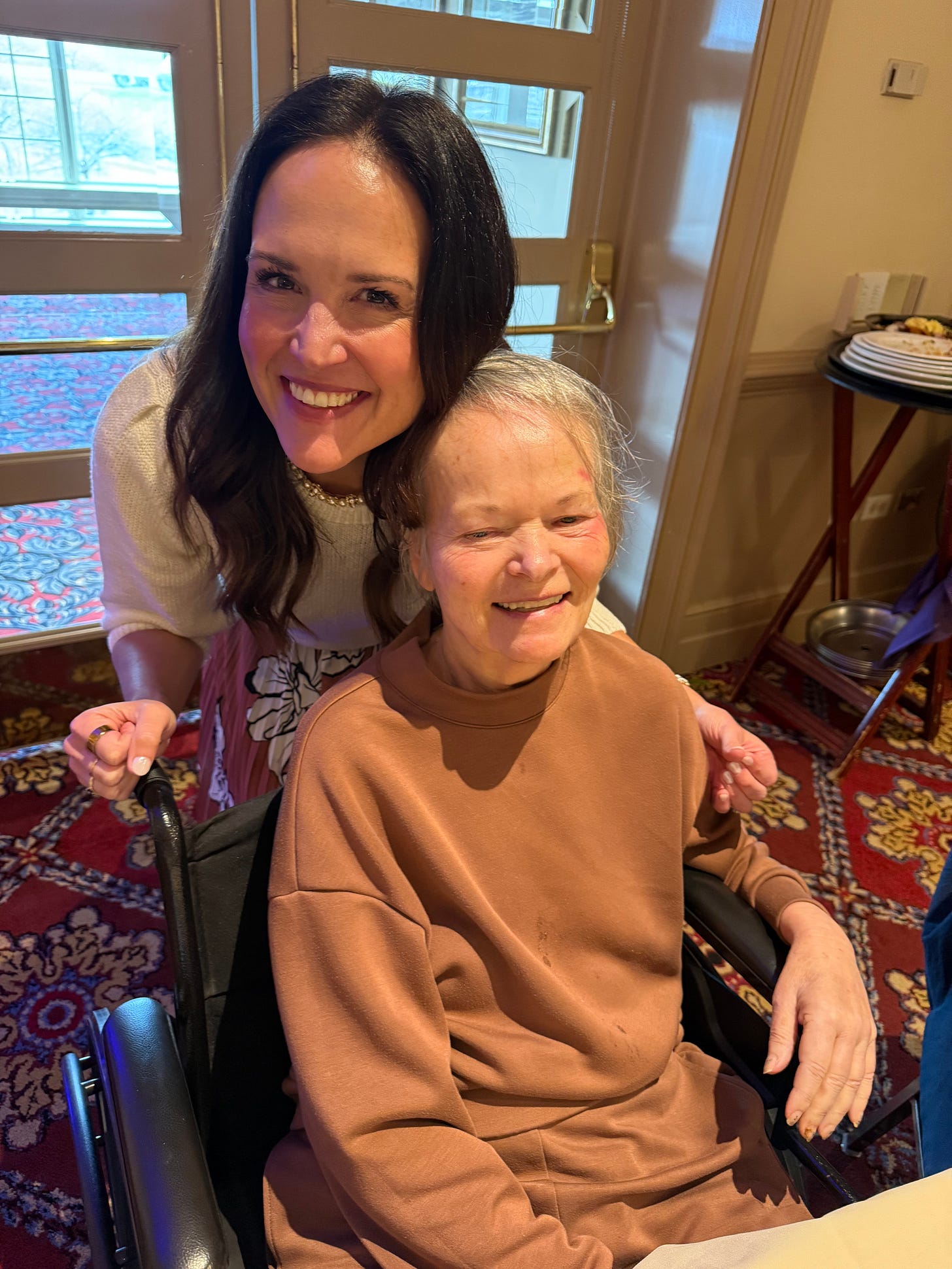There are moments in life that you can see approaching from a distance—slow and sure as a horizon line on an endless prairie—and yet, when they finally arrive, they knock the breath out of you like a punch you've been bracing for your whole life.
Last week, my mother entered hospice.
We knew this time would come. We've walked with her through the long shadows of this cruel disease, Frontotemporal Dementia. We’ve been with her through the memory loss, through the slow unraveling of her once-sharp mind and vibrant self. It's been months—years, really—of watching a strong woman grow small, witnessing the gradual diminishment of someone who once commanded rooms with her laughter. The woman who taught me to read, to pray, to stand tall when afraid—now curled inward like a question mark against bed sheets. And yet, nothing prepares you for the ache of saying goodbye while she is still breathing, for the strange grief of mourning someone whose hand you can still hold.
Hospice is not just a place; it's a threshold. It is a holy, humbling space that invites us to lay down our need for control and enter into mystery. It does not pretend to fight death or deny its approach. Instead, it dares to sit beside it with compassion, to look it in the eye without flinching. It acknowledges what we as Christians proclaim each week in our creeds—that death is real, but it is not final. That something awaits beyond the veil we cannot yet see.
I find myself returning to that moment when Jesus stood at Lazarus's tomb. The Gospel tells us He wept—not because He didn't trust resurrection, but because love mourns what sin and decay have stolen. In moments like this, I feel the weight of that sacred sorrow seeping into my bones. I feel the weight of being a daughter and a pastor simultaneously, a witness and a child, holding tension between grief and hope like two live wires that must never touch.
There's a tenderness in watching someone you love come to the end that strips away all pretense. The world grows quieter, as if someone turned down the volume on everything peripheral. There are fewer words, and yet everything feels drenched in significance. A touch on the hand becomes a benediction. A whispered "I love you" is communion. The simple act of brushing her hair—hair I once watched her style with such care—becomes liturgy.
In this space between worlds, theology meets bone and breath. It is not abstract or academic. It is embodied in the in the rhythm of breathing, in the sacred silence of my mostly non-verbal mother. And I return, again and again, to the core of our confession: that we belong to a God who took on flesh, who walked with the dying, who broke bread with the brokenhearted, who defeated death not by avoiding it—but by passing through it. By drinking the cup to its dregs.
This is not just my mother's hospice journey. In many ways, it's mine too. I am learning to let go one finger at a time. To release my grip on what once was—on the mother who knew my name without hesitation, who remembered the stories of my childhood, who could finish my sentences. To trust that God is just as present in her final breaths as He was in her first cries. I am learning to love without trying to fix. To honor the mystery. To let the Spirit groan when my own words fall short, when the prayers catch in my throat like stones.
There's a part of me that wishes I could scoop up the pain and preach it into something pretty. The pastor in me wants to find the silver lining, to move too quickly to resurrection hope before fully honoring the crucifixion moment. But this is not a time for tidy theology or polished reflections. This is the time for the deep-down kind of trust—the kind that sings through tears, the kind that echoes Psalm 23 in the valley, the kind that sits in Saturday's silence between cross and empty tomb.
And so, if you're walking a similar road, know this: you are not alone in this sacred, terrible, beautiful journey. There is grace for the letting go. There is mercy in the waiting. There is profound holiness in the simple acts of presence. There is a Savior who sits beside the bedside, who anoints our heads with oil even as tears fall, and who walks us all the way Home—both those departing and those left behind.
Until that day when every tear is wiped away, and we are all made whole—I will sit beside my mother, I will hold her hand, and I will trust in the One who holds us both in the palm of His scarred hand. I will whisper back to her what she once taught me: that love is stronger than death, that goodbye is never the final word.





This is one of the most sacred reflections I’ve read on hospice. You captured the ache of saying goodbye while someone is still breathing. The brushing of her hair as liturgy—that stopped me. Thank you for naming what most of us can’t. Love like this is holy ground. You’re not alone.
—Virgin Monk Boy
This is so beautiful Tara Beth. Thank you for sharing your story and your gift of describing OUR story. I went through this with my mom and dad and am comforted in reading about your experience. I praise God for you.❤️🙏